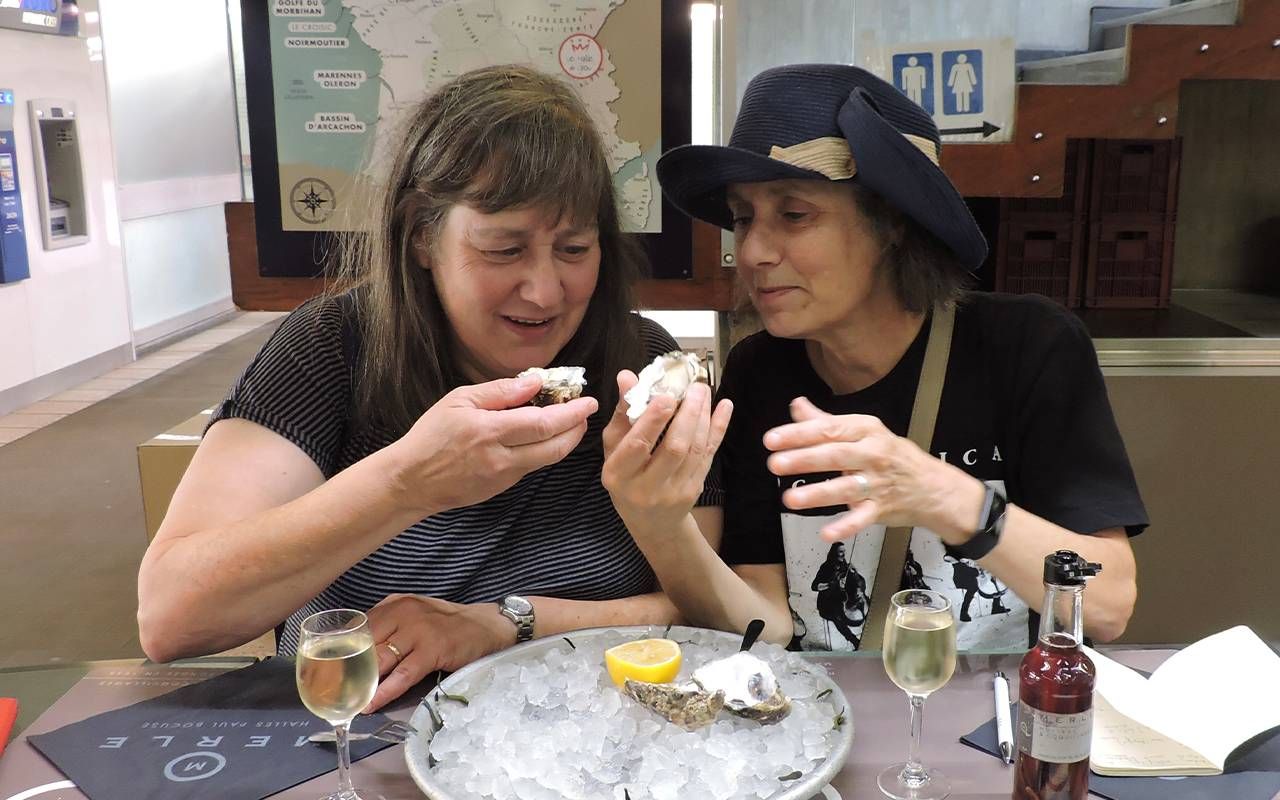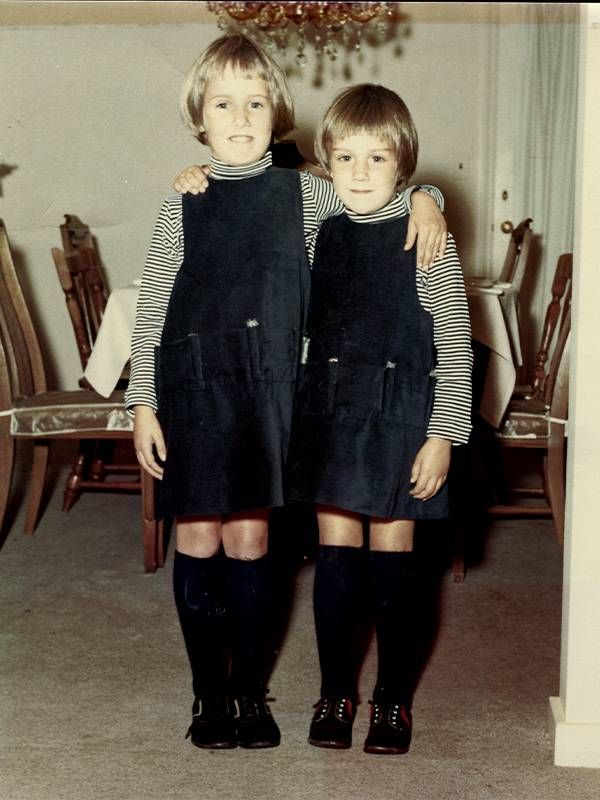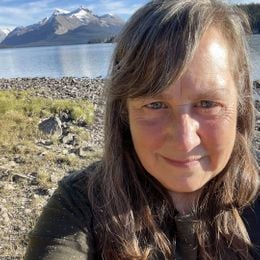After My Father Died, So Did My Close Relationship With My Only Sibling
It took years, but we worked through the resentment and denial. Today, we embrace the gift of our deep bond.
The summer after my father died, my sister went missing at a James Taylor concert. By the time she turned up two hours later, bubbling with excitement because she'd been invited to sit backstage, I was unhinged.

Dad had disappeared barely four months earlier. He was missing seven weeks before his body surfaced in a lake a half hour from our house. I couldn't believe it never occurred to Amy that while she was having a VIP adventure, I'd be searching for her, oblivious to the music, convinced she was dead.
"I told my friends to tell you where I was," she pleaded. "I'm so sorry."
She might have been crying. I didn't care. I swore I'd never forgive her.
All I knew was that since Dad died, the loving, funny sister I'd once adored had been replaced by a self-absorbed, sullen teen.
I had no idea what a grudge was, that I was latching onto something that would distort our relationship for decades. All I knew was that since Dad died, the loving, funny sister I'd once adored had been replaced by a self-absorbed, sullen teen. When she wasn't locked in her room blasting music, she was fighting with Mom.
Among the few things Amy and I shared after Dad died was crippling separation anxiety triggered by how he'd exited our lives. Mom's explanation was that he'd gone for a walk, slipped and drowned. When Amy and I asked for more details, she replied with aphorisms: "How he lived was more important than how he died" and "Look at the cup half full. You had 13 good years with him"—14 if she were talking to Amy.
Confused and Growing Apart
If we kept asking, she'd get mad. That led to the other things Amy and I shared: fear of Mom and the unspoken understanding that Dad's death was a forbidden topic. Instead of airing and sharing our grief and confusion, we pretended they didn't exist.
In retrospect, Amy did nothing out of character for a teenager dealing with inexplicable loss: she simply became the safest target for my festering grief. That her behavior stemmed from the same well of pain as mine never occurred to me. I went from idolizing to despising her, which was easier than acknowledging that what I really despised was our new, fatherless life with a mother whose temper terrified me.
When I think back to those years, I see Mom, Amy, and me as satellites orbiting the untouchable planet that was Dad's death. I can't help wondering, what if we'd talked about the real reason he died? But nobody talked about suicide in 1974.
The first time I remember the subject coming up with Amy was 11 years later, when I called her before starting therapy. We still weren't close, but I didn't know anyone else who'd seen a psychologist. I wanted to know what to expect.
"How did therapy help you?" I asked.
"It helped me to accept that Dad killed himself," she replied.
I felt like she'd slapped me. I knew she wouldn't say something like that if it wasn't true, but I wasn't ready for that much truth.
I'd signed up for therapy because I was 24 and wanted a boyfriend. Clearly, Amy was in a whole different universe, one I had no interest in inhabiting.
Learning the Truth
Often, I found myself thinking that if we weren't related, I'd have nothing to do with her. I didn't understand her and I was appalled at her choices: marrying young, moving a thousand miles from home, throwing away a college education to make babies with a man who seemed to have no respect for her.
Often, I found myself thinking that if we weren't related, I'd have nothing to do with her.
And yet she was determined to keep me close: she wrote me letters, called regularly, flew me to visit because I couldn't afford the plane fare.
A few months into therapy, I worked up the courage to push Mom for the truth about Dad's death. She told me he'd been depressed for months, that the night before he disappeared he said, "You'd all be better off without me."
I'd always suspected the accident story was fishy, but accepting the truth was harder than I expected. Even after three years in therapy I couldn't bring myself to think, much less say, "my father [died by suicide]" without feeling guilty. How had it been so easy for Amy?
Stuck between denial and acceptance, I wrote to her for advice. She responded immediately, a long, heartfelt letter reassuring me I was on the right path. I appreciated her wisdom, but it was another 10 years before the emotional wall I'd erected at the James Taylor concert crumbled.
Slowly Welcoming Her Into My Life
By then I was a new mother. Maybe that's what gave me the insight I'd been missing for so long. All I know for sure is that when a friend said something that struck me as unfair and judgmental, I almost blurted out You have no right to think that way, which is when it hit me: I was the one who'd been unfair and judgmental, not to my friend, but to Amy, ever since the concert. It wasn't Amy I'd been mad at for abandoning me, it was Dad. Amy had been there all along.

I called and apologized. Over the next few years I began welcoming her into my life in a way I hadn't since we were kids. Still, talking about the past was a challenge. About some things, we were in complete agreement, but others — including Amy's theory that I'd been Mom's favorite and she was Dad's — stoked old resentments.
When Mom grew ill and moved to a senior residence in Milwaukee to be near Amy, those resentments nearly fractured our relationship for good. When I visited, I'd stay with Mom and see Amy daily. At some point during every visit, we'd have at least one huge fight. I can't remember the specifics, only that it didn't take much for us to offend each other.
After Mom moved into a nursing home, the fights escalated, reaching their nadir the day Amy complained I wasn't spending enough time with her — even though I was staying at her house.
I vented my frustration to Mom. "I'm here to see you, not her!" I exploded.
I expected her to take my side. I was in for a surprise.
"You need to spend time with Amy, too," she said.
Rebuilding Our Relationship
Maybe she understood the extent of the damage wrought by the silence surrounding Dad's death. Or maybe, as the youngest of five children, she understood that after she was gone, Amy and I would need each other: we would be each other's institutional memories.
Instead of reverting to our defensive crouches, we listened to each other.
I started hanging out with Amy more — taking dog walks, losing to her at Scrabble, cooking. A couple of times we drove 30 hours round trip to see family and friends in central New York. Those rides gave us time to talk about Dad's death and everything surrounding it.
Instead of reverting to our defensive crouches, we listened to each other. Instead of disputing each other's feelings, we validated them, acknowledging that even though our relationships with our parents were different, our losses were equally profound.
When Mom died in 2018, 10 days after her last surviving sister, she did so knowing that even though Amy and I live thousands of miles apart, we are closer than ever. We'll never recover those years lost to misdirected anger and unacknowledged grief, so instead I focus on what we do have: an ever-deepening bond. Our relationship is a gift, hard-won.


